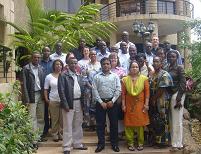 A five-day workshop—Strengthening the Quality of Fistula Prevention and Repair Services: Institutionalizing Medical Monitoring—was held February 1-5, 2010, in Kampala for 28 EngenderHealth staff and partners working on the Fistula Care Project. Workshop participants included medical associates and program managers from the global team and from seven countries where activities are being implemented: Bangladesh, Ethiopia, Guinea, Mali, Nigeria, Rwanda, and Uganda. The focus of the workshop was to provide a forum in which to share experiences from the field and lessons learned from the introduction of Fistula Care tools. Participants aimed to standardize approaches for improving the quality of fistula services through medical monitoring and to develop plans to institutionalize medical monitoring tools and approaches in national programs.
A five-day workshop—Strengthening the Quality of Fistula Prevention and Repair Services: Institutionalizing Medical Monitoring—was held February 1-5, 2010, in Kampala for 28 EngenderHealth staff and partners working on the Fistula Care Project. Workshop participants included medical associates and program managers from the global team and from seven countries where activities are being implemented: Bangladesh, Ethiopia, Guinea, Mali, Nigeria, Rwanda, and Uganda. The focus of the workshop was to provide a forum in which to share experiences from the field and lessons learned from the introduction of Fistula Care tools. Participants aimed to standardize approaches for improving the quality of fistula services through medical monitoring and to develop plans to institutionalize medical monitoring tools and approaches in national programs.
Welcoming remarks were provided by EngenderHealth’s Uganda Country Director, Edith Mukisa, and Fistula Care Project Director Karen Beattie. Opening remarks were made by the Vice President of EngenderHealth, Dr. Isaiah Ndong, and the workshop was officially opened by Dr. Andrew Namonyo of USAID Kampala. The Director of Clinical Services, Dr Joshua Amandua, and Sister Miriam Namugere of the Division of Reproductive Health also gave remarks on behalf of the Ugandan Ministry of Health during the first day of the workshop.
Participants spent a lively five days exploring country programs’ experiences with implementing medical monitoring and other quality improvement tools and approaches in fistula programming. The primary focus of each day was on the purpose and objectives of medical monitoring, its role in improving fistula services, and its critical components—notably, ensuring medical safety, hearing the clients’ perspectives, and ensuring informed choice and decision making. The highly participatory workshop included presentations and incorporated role plays, interactive exercises, and group work to facilitate information-sharing about challenges that attendees had experienced in supporting medical monitoring at their sites.
The rest of the workshop delved into the key quality improvement tools and approaches that are being used at the country level to supplement and improve fistula services and medical monitoring. Participants shared their experiences and discussed how to integrate informed consent and ongoing facilitative supervision into treatment services. A half-day session was given on the use of “data for decision making” and to orient participants on the three modules that have been created for the project to support improving the use of data at the facility, country, and national/working-group levels.
Update sessions provided information on Fistula Care research activities; training; new web-based and facilitation tools from the project and the international fistula community; and EngenderHealth and USAID regulations concerning family planning. Workshop participants also worked in small groups to create country-specific action plans for working with their counterparts to integrate medical monitoring and quality improvement tools and concepts into national programs for fistula.
The workshop demonstrated that in most countries, approaches such as the training strategy, levels-of-care framework, and quality improvement strategy are working well, although there are some challenges concerning sustainability and national government support. Some suggestions for improvement included the need to further adapt the tools and approaches to the local context through translation of documents and the need to better integrate medical monitoring into other reproductive and maternal health services.


